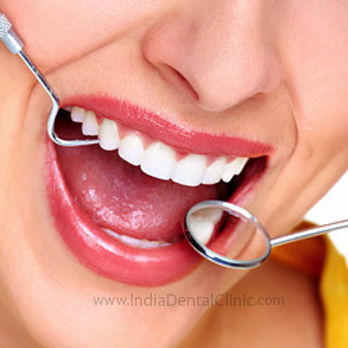Gum Disease
More On Periodontics
About PeriodonticsFlap Surgery
Gingivectomy - Gingivoplasty
Bone Grafts
Scaling & Root Planing
Cosmetic Gum Surgery
Frenectomy
Healthy Gums
Osseous Surgery
Scaling & Polishing
Oral Prophylaxis
Soft Tissue Grafts
Overview - Gum Disease Care in India
Periodontal gum disease information provided by dental care specialist dentist (periodontist) consulting at India Dental Clinic. Periodontal disease (also called as "periodontal infection", "gum disease" or "pyorrhea") is mild to severe inflammation and infection of the gums, tissues and bones supporting and anchoring teeth to the jaw. Gum Disease is caused by a serious bacterial infection that can spread around the root of the teeth causing bone reduction and, if left untreated, tooth loss. The bacteria interact with acids and food particles in the mouth to form plaque, a sticky film on the surface of teeth and gums. When plaque remains on the teeth it can harden into tartar (calculus). Tartar that forms below the gum line can only be removed by a dental hygienist in a professional cleaning. Gum disease is nearly 75% reason of tooth loss in older adults. A skilled periodontist will evaluate your condition and depending on its severity, recommend either non-surgical periodontal treatment or gum surgery at dental tratment clinic in India.
The Indian dentist treating you at world class dental clinic India would like you to understand that non-plaque induced reasons like oral thrush (candidiasis) which is a fungal infection that can causes gingivitis. A thin film coats the inside of the mouth and the gums bleed when wiped. It is treatable with anti-fungal medications. It also occurs where maintaining oral hygiene like brushing and flossing is mostly found irksome or need extra care. These are normally areas like molars, bridges and implants. Poorly fitted dentures, an impacted tooth and similar mechanisms can cause pockets to form in the gums, which may lead to inflammation and infection. On rare occasions, as may be assessed at India Dental Clinic, allergies can also cause the gums to become inflamed.
With the infection being present, periodontal (gum) disease goes through several stages. The immune system is hardly ever known to have won the battle. As the disease progresses in severity, the periodontal treatment options become more complex, costly, and time-intensive. Periodontal disease is an ongoing infection in the pockets around your teeth. Your immune system is losing the battle and, without treatment, it will get worse. It is important that at the first signs of gum disease symptoms you seek an experienced and professional periodontist possibly listed with India Dental Clinic.
Symptoms of Periodontal Infection
Gum disease is known to be a silent disease. Periodontal infection is usually painless until it reaches an advanced stage. However, there are some symptoms that can indicate the presence of periodontal infection.
These include:
1. You notice bleeding when brushing or flossing
2. An attentive look show your gums red or swollen
3. You feel tender gums that some times are itchy and ache
4. A closer look show teeth to have become longer which is actually receding gums
5. Bad breath that does not go after use of a mouthwash
6. Sores in your mouth
7. Change in your bite
8. A touch gives you feel of loose teeth
9. An abscess or pus formation indicating infection
10. Increased spaces between teeth
11. A change in the fit of your partials
Any of these conditions could be your warning signs of periodontal infection, please have your general dentist make a periodontal evaluation for you or recommend consultation with the India Dental Clinic listed periodontist. It is important to note that your gums can look and feel quite normal and yet deep pockets of periodontal infection can still be present. To be certain about any periodontal disease, insist that your dentist or periodontist to examine your gums for signs of infection.
Types of Gum Disease
Gingivitis
Gum disease in it’s earliest and mildest or most common form is called gingivitis. Gingivitis is characterized by swelling of the gums. Gingivitis can be classified by the underlying cause or causes of the condition. These include weakened immune systems, poor diet, and hormonal changes in women, oral fungus or viruses or as a result of taking certain medications. Often, the gums will bleed during normal brushing and flossing. Gingivitis is reversible with professional periodontal treatment at India Dental Clinic and consistent oral care at home. Except for those who may be genetically more susceptible to periodontal problems, the disease can be prevented through regular brushing and flossing (oral hygiene).
Periodontitis
Gingivitis, when not arrested in time, worsens into a more severe form of periodontal disease called periodontitis. In this condition gums pull away from the teeth, forming periodontal pockets that trap bacteria and food particles, as you may be assessed at the Indian dental clinic. Over time, periodontitis can lead to the destruction of gum and bone tissues, which may eventually cause the teeth supported by that periodontal tissue to fall out or have to be extracted.
Advanced Periodontitis (Severe Periodontitis)
You may get your periodontal evaluation done at India Dental Clinic. There are several stages of periodontitis of which the major classifications include chronic periodontitis, aggressive periodontitis, periodontitis caused by systemic disease, periodontitis associated with pulpal infection, necrotizing ulcerative periodontitis and periodontitis as a result of developmental or acquired deformities. In its advanced stage, Periodontitis or pyorrhea becomes very serious when bone loss occurs which is irreversible. When periodontitis has progressed to the advanced stage, the gums severely recede (pull away from the tooth); pockets deepen and may be filled with pus. There may be swelling around the root and you may experience sensitivity to hot or cold or feel pain when brushing your teeth. This is due to the severely receding gums exposing the root surface. As bone loss increases, your teeth may lose so much support that they may fall out or need to be removed to preserve the overall health of your mouth. This is a very aggressive form of gum disease and often leaves gum surgery as your periodontist’s only treatment option.
Causes of Gum Disease
The foremost known cause of periodontal (gum) disease is bacterial plaque, a highly adhesive, clear film that is constantly forming on your teeth. The following causes have also been attributed to gingivitis and the more advanced forms of periodontitis:
* Smoking and tobacco use is a significant promotor of gum disease. Smoking is no secret contributor to a host of many other health related issues.
* Genetics predispose a large population to gum disease, irrespective of the fact in maintaining good oral health care. This group of people is six times more likely to develop periodontal disease than those who are not genetically susceptible to gum disease.
* Pregnancy, though a cause for celebration socially, also brings the hormonal changes that lead to an increased susceptibility to gum disease. Severe hormonal fluctuations are known to affect a number of tissues in your body, including your gums.
* Medications that you take for health reasons like heart conditions, etc., or personal reasons such as oral contraceptives, also negatively impact your overall oral health. It is important you inform your periodontist of the medications you are taking and of any subsequent changes.
* Grinding your teeth (bruxism) is also known to accelerate the rate at which gum disease destroys the sensitive support system of your mouth, causing decay, root canal and maybe tooth loss in extraction.
* Diabetes is another major cause that brings fluctuations and alterations in your blood sugar, leading to severe periodontal disease that requires gum surgery.
* Poor nutrition affects the immune system, weakening body’s natural ability to fight off gum disease besides leading to a multitude of health-related complications.
In general, often found at India Dental Clinic, people with poor oral hygiene or poor nutrition stand increased risk of developing cardiovascular disease, including stroke and heart attack. Smokers, women, people with diabetes and those with a family medical history of periodontal disease are also at higher risk. In addition, studies suggest a link to pregnant women with the disease may be at higher risk of premature or low-birth weight babies. A dentist diagnoses periodontal disease using x-rays, dental examinations and dental histories. A probe is used to determine the level of gum and bone damage by measuring the depth of the periodontal pockets formed between the teeth and gums (sulcus).
Periodontal (Gum) Disease Treatment in India
Gingivitis Treatment:
The early stages of gingivitis can be reversed with non-surgical treatment as may be recommended by your periodontist, besides prescribing certain medicines and the mouth rinses. But in the case of advanced periodontitis, gum surgery may be required. The biggest factor in the treatment options available to you will be how quickly your gum disease is detected and how rapidly it advances.
Examples of gum treatments at India Dental Clinic for the milder form of periodontal disease (gingivitis) include scaling and polishing. This procedure is painful or uncomfortable for some, especially if gums are already sensitive. A topical analgesic, which numbs the nerves and usually eases the pain, can be swabbed onto the gums prior to and during cleaning. For hyper sensitive patients, stronger measures, such as anesthesia, may be used. An ultrasonic scalar device, which sends out sound waves on high frequencies to break down plaque and tartar, may also be used. Polishing is the buffing of tooth surface on which plaque has more difficulty forming on a smooth surface, helping maintaining healthy gums.
Scaling and root planing. This method of periodontal treatment thoroughly cleans the root surface to remove any plaque and tarter build-up. A deep cleaning at dental clinics in India of the root (cementum) eliminates crevices, holes or uneven surfaces that can harbor bacteria and plaque. Following that, antimicrobials may be locally delivered to ward off any remaining bacteria. Some patients may require deep cleaning (debridement) more often than twice yearly.
Advanced Periodontitis Treatment:
More severe periodontal cases of advanced gum disease often require periodontal (gum) surgery performed by periodontist at India Dental Clinic. In a situation when deep pockets of 5 millimeters (mm) or more are present gum surgery becomes the only viable periodontal treatment once the tissue around your teeth becomes too unhealthy to be repaired with non-surgical treatment. The types of gum surgery most often recommended are Pocket reduction procedures; Regenerative procedures; Crown lengthening; and Soft tissue grafts.
* Flap surgery: This procedure involves cutting a flap in the gums and pealing the tissue back to expose the roots to more thorough scaling and planing. The periodontist can also reshape the alveolar bone or put in splints to support weakened areas.
* Curettage: The procedure involves scraping bacteria off of gum tissue using a sharp instrument called a curette.
* Gum grafts: In a situation when healthy gums have eroded or died, the procedure to cover the exposed roots with tissue taken from the roof of the mouth (palate) becomes necessary. The periodontist cuts a piece of palate tissue and sews (sutures) it onto the gum line. Donor tissue may also be used for this procedure.
* Bone grafts: When the advanced periodontitis destroys the alveolar bones that anchor teeth to the jaw, the periodontist may attempt to repair the damage by attaching a piece of the patient’s own bone or synthetic bone material to the site. This provides a more stable anchor for the teeth and may help prevent tooth loss.
* Guided tissue regeneration: The procedure involves Periodontist placing a mesh of biocompatible material into the area of the bone graft between the bone and gum to stimulate new bone growth, bringing back to healthy gums.
Downsides: The patients already undergone certain vital surgical procedures or who have some ongoing medical conditions (e.g., total joint replacements, rheumatoid arthritis, and certain cardiovascular disorders) should inform their dentist at India Dental Clinic. A dose of antibiotics taken an hour before the dental appointment may be required for these individuals. A periodontal deep cleaning can cause the harmful bacteria being scraped off the teeth and roots to flow into the bloodstream, leading to potentially life-threatening complications.
More dental deals in Other Cities

Invest in your SMILE and get 20% off
Treatments Covered-- All-on-Six Implants
- Dental Implants
- Dental Braces
- All Ceramic Dental Crowns
View Details Amritsar

Dental Orthodontic Wire Treatment
Special Price - 25000 (INR-Indian Rupee )Treatments Covered-
- Comprehensive Oral Exam
- Dental Braces
View Details Nashik

Smile Makeovers At Special Discount
Special Price - 6400 (INR-Indian Rupee )Treatments Covered-
- All Ceramic Dental Crowns
View Details Lucknow

